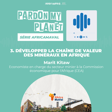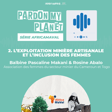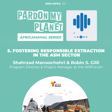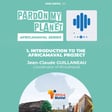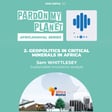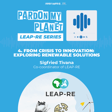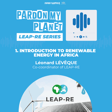Become a Creator today!Start creating today - Share your story with the world!
Start for free
00:00:00
00:00:01

What are Advanced Biofuels?
In this episode, we delve into the world of advanced biofuels! Today, we spotlight an innovative European project called BL2F, which is pioneering a technology to produce sustainable fuel for transport, including aviation and maritime sectors, from an unexpected source: black liquor.
Joining us for this enlightening discussion is Adéola Jaiyeola, Sustainable Innovation Analyst at LGI, who will guide us through the landscape of current fuel options and why it’s crucial to invest in environmentally-friendly technologies. Tune in as we explore the future of sustainable transport and the role of advanced biofuels in shaping a cleaner, greener world.
More information on: lgi.earth/podcast
Transcript
Introduction of LGI Podcast and Guest
00:00:09
Speaker
Hello, hello, welcome to this very first episode of the part on my planet show. I'm very happy to host the LGI podcast and we opened this first podcast with Adeola, sustainable innovation and the latest at LGI. So hello Adeola and thank you for being here.
00:00:27
Speaker
Hello, so first of all thanks for having me.
Sustainable Innovation at LGI
00:00:31
Speaker
So yeah, I work for LGI which is a sustainable innovation company based in Paris and we are involved in a lot of research and development projects on several topics such as renewable energy, critical raw materials, nature-based solutions and in my three years of experience at LGI
00:00:51
Speaker
I had the opportunity to work on some market research, policy analysis, impact assessments, but today I'm here to talk about advanced biofuels. Thank you Adeola.
Advanced Biofuels and the BL2F Project
00:01:04
Speaker
So today we are focusing on advanced biofuels, more precisely on beltwave projects and the projection of advanced biofuels for the transport sector. So Adeola, to give some context, could you give us an introduction of the project?
00:01:20
Speaker
Yes, sure. LGI is involved in this project called BL2F, which stands for Black Liquid to Fuel. Basically, it's a European research and development project which involves several research and industrial partners across Europe. The goal of this project is to develop some advanced biofuels to contribute to the decarbonization of agitation and shipping and to reduce dependence on fossil fuel.
00:01:47
Speaker
So in this project, our team has conducted several studies. We have made a prospective study on the factors that will impact the future demand for advanced biofuels by 2040. We analyzed the advanced biofuel policies in the European Union and some specific countries. And we also studied the possibilities of producing some biofuels based on some other raw materials, such as sewage sludge or bulk residues.
Traditional vs Advanced Biofuels
00:02:14
Speaker
To start, what are biofuels? The definition of biofuels and what is the difference between traditional biofuels and advanced biofuels?
00:02:24
Speaker
Yes, so let's start with the definitions indeed. So the biofuels are some fuels produced from biological raw materials. It can be bio waste, animal manure, sewage sludge, nut shells, et cetera. And it's also important to note that there are four different types of biofuels that exist. But in this podcast today, we'll focus on two types only, the first generation biofuels and the second generation biofuels, also known as advanced biofuels.
00:02:54
Speaker
So to start with the first generation biofuels, they are the most well-known, but they are also quite controversial because they are criticized due to their unsustainable nature. Basically, they are produced from some types of biomass that are often used for food production. So for example, corn, sugarcane, soy.
00:03:16
Speaker
And that's actually a major problem because it raises the food versus fuel dilemma regarding the risk of diverting farmland or crops for biofuel production to the detriment of food supply. And this possible competition between food production and fuel production could have a significant negative impact on food security. But these types of biofuels are expected to be phased out by 2030, meaning that they will not be used anymore.
00:03:44
Speaker
Right, but in the Bealtorf project, it's more about second generation, right?
BL2F Project and Sustainability
00:03:49
Speaker
Right. In the Bealtorf project, our focus has been on the development of second generation biofuels or advanced biofuels. And to define advanced biofuels, they can be produced from materials like agricultural and forestry residues, non-food crops, so for example algae, industrial waste, residue streams,
00:04:12
Speaker
And the specificity of these biofuels, the advanced biofuels, is that they have low carbon emissions and high greenhouse gas reduction. And so currently they are starting to decarbonize the adhesion and shipping sectors as an alternative solution to fossil fuels. Could you tell us more about the specificity of the advanced biofuel developing the BL-12 project?
00:04:38
Speaker
Yes. So more precisely in the BL2F project, the advanced biofuels that is developed is based on black liquid. And black liquid is a side stream from the pulp and paper industry. It looks just like a black liquid and it's a by-project of the craft process. And the biofuels that we are developing, they did not interfere with food security and they did not contribute to deforestation. They are advanced biofuels.
00:05:08
Speaker
Very surprising. So the team at LJ carried out a study aiming to identify major trends in the future demands of the biofuel market. And how did you identify these trends in the first place?
Future Demand and Influences on Biofuels
00:05:22
Speaker
So yeah, good question. So we studied more than 30 factors in total across the political, economic, societal, technological, and environmental spectrums. It was a really broad diversity of factors. For example, what would be the impact of a political crisis on the future biofueled events of an increase or decreased demand for adaptation of some technological development of other type of aircrafts.
00:05:49
Speaker
And we studied the possible impacts of all of these factors and we evaluated them with experts. And most actually had quite limited impacts in the long term for the future biofuel demand. And so based on this study, what will most influence the future advanced biofuel market? So out of all of this, we found that political decisions at European level will have the most impact in actually driving the demand for advanced biofuels in aviation and shipping.
00:06:19
Speaker
But why will political decisions have such a big influence on the future of advanced biofuels?
Political Influence on Biofuels in the EU
00:06:26
Speaker
So in general, political decisions will have a very considerable role to promote advanced biofuels and low carbon energies in general in aviation and shipping, especially because there are quite few options to decarbonize these sectors at the moment.
00:06:44
Speaker
And in the European Union, there are already some directives supporting that. The Renewable Energy Directive, also called RED2, supports the production and the development of renewable energies, and that includes promoting the advanced biofuels for adhesion and shipping.
00:07:02
Speaker
There is also the Green Deal, which objective is to make Europe the world's first climate neutral continent by 2050. And it's in the interest of the decarbonisation objectives to promote advanced biofuels. Thank you Adeola. So speaking of policy, you also analysed policymaking at the international, European and national levels in nine different European countries. What did you find after this analysis?
Scandinavian Leadership in Biofuel Policies
00:07:30
Speaker
Yes, so we found that Scandinavian countries and more specifically Denmark, Norway, Sweden and Finland
00:07:38
Speaker
are where the policies are the most progressive regarding the incorporation of advanced biofuels in aviation. It's a bit less developed in shipping, but some regulations that are targeted to Maritim are still emerging in some of these countries. But still beyond these four countries, it's not only limited to those. There are more and more countries across Europe,
00:08:01
Speaker
that are adopting some mandates to include advanced biofuels in navigation and shipping. Also, it's a bit more focused on adhesion than shipping for now. And can you give us an example of one of their biofuel policies and what did they do finally to solve the problem?
00:08:18
Speaker
Yeah, so for instance, in Norway, the national biofuel mandate is among the highest in the world at the moment. Since 2020, Norway introduced a quota requirement of 0.5% advanced biofuel inization, and it is proposed to increase to 30% by 2030. And Norway is also considering to introduce a biofuel obligation for the maritime sector.
00:08:44
Speaker
And based on your research, is the European policy framework headed in the right direction? So the short answer is yes, but also we never know. Yes, because more and more countries in Europe are adopting some advanced biofuel mandates with a minimum obligation that is becoming higher and higher.
00:09:07
Speaker
as you said, for Norway and their ambitious. Yes, right. But on the other hand, although the Red 2 and some other policies promoting advanced buy issues have very ambitious long-term goals, policies can be reformed with decision being reversed or target being postponed. So even if a policy is implemented, it doesn't mean that it will remain in the long-term.
Role of Advanced Biofuels in Reducing Emissions
00:09:32
Speaker
Based on all of this, are advanced biofuels the future? What does the future look like for the use or projection of advanced biofuels?
00:09:43
Speaker
So that's a good question. Advanced biofuels are not necessarily the future. They may not be the future, but they should be parts of the future at least. For now, advanced biofuels are only produced at limited scale and their production quantity will not be sufficient in the short term to compete with fossil fuel production that is very considerable and to fully cover the market for adaptation and shipping.
00:10:10
Speaker
But at the same time, advanced biofuels are expected to be essential in aviation and shipping, at least until 2050. The main arguments for advanced biofuels are that they are dropping fuels, meaning that they can be used in the existing infrastructure, they have high energy density, and they are available right now. So this is a real advantage in comparison to some other solutions.
00:10:38
Speaker
They can be used in aviation and shipping, where large-scale electrifications or operations with hydrogen are difficult. And by 2040, at least, the advanced biofuel demand is expected to rise inevitably, encouraged by the ambitious objectives set by the policymakers in Europe.
00:10:56
Speaker
So maybe we can expect advanced biofuels along with other solutions to decarbonize aviation and shipping. So what about hydrogen power to liquid fuels, for example, electricity or even solar powered aircrafts?
00:11:14
Speaker
Yeah, absolutely. Advanced biofuels are actually only one of several options for reducing carbon emissions in the agitation and shipping sector. And although not all the solutions that you quoted are available right now, they may also be part of the future.
Decarbonizing Aviation and Shipping: Multiple Solutions
00:11:30
Speaker
Many different solutions are needed to decarbonize aviation and shipping in the next 20 years and several complementary solutions will be developed and scaled up in line with fulfilling the greenhouse gas reduction objectives and reducing our dependence to fossil energy sources.
00:11:48
Speaker
We finally hope that advanced biofuels will most certainly be part of a future with less carbon emission in long distance transportation. So thank you for your expertise. Adeola. Thank you, Anwar. This was the first episode of the Pardon My Planet podcast. I'm Anwar and I see you at the next episode.
